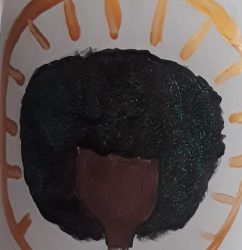“This makes absolutely no sense,” Lynn muttered, as she stood over her dark-haired companion. Her short red curls were sticking to her scalp as if they too were unsure of their surroundings and were cowering near what they knew best. She could taste the salty sweat dripping down her cheek. Lynn’s partner was sitting against the wall, her legs splayed in front of her, seeming to stretch across the room. She held her hand in front of her face, so she could blow softly on her fingers, her eyes closed in contemplation. “Any reason in particular that we’re here, Cyn?” Lynn kicked her partner’s muscular thigh.
Cyn peeked one eye open at the Amazonian redhead before her, and shrugged. “It feels like the right place to be.”
“Of course it feels like the right place to you! There’s candles everywhere! We may as well be sparks hiding in a matchbox!”
“If I remember correctly, I used my last bit of fluid to burn whatever evidence you left at the bank.”
“Last bit? There’s no way that could’ve been a ‘bit’. You burnt the whole place to the ground. No one would even know we had been there if it wasn’t for you!”
Cyn bit her lip to keep it from trembling. She remembered the blaze. Beautiful. Bright. Tall. Red, with a hint of blue in the eye of it, just like . . . Now was no time for that. The police were on their tail. She had hoped that hiding out in one of the most combustible places would benefit them at least for a while—hiding in plain sight and all that. But how were they supposed to get out of town. Especially with Lynn as angry as she was. She gets clumsy when she’s angry, and when she’s clumsy, they get caught. Cyn wouldn’t leave her, but there was no way they were getting locked up again. Not when they finally had enough money to disappear forever. The thought of losing that opportunity left a bitter taste in her mouth.
“Fuck, do you hear that?” Lynn had gotten antsy.
“I don’t hear anything, Red,” she replied, but Cyn’s eyes were wide open now. The red and blue of sirens was barely visible in the distance through the windows of the factory, but they were growing, fast. And they were approaching from every angle.
“Where do we go? Is there a way out of here?” Lynn panted, her eyes darting in every direction, her taunt body growing stiff. Cyn pulled herself off the ground. If this had been last year, they could’ve escaped through the sewers into the river, but those sewers had been sealed shut when she attempted to burn down the candle factory and the wax melted over the drains. The place wasn’t as combustible as people thought, but one more fire and it would probably blaze correctly. “Come on, Cyn. Wake up! We have to get out of here,” Lynn yelled, as she shook Cyn to attention. Cyn grabbed her partner by both shoulders. She was probably the only person, male or female, who could look Lynn in the eyes. That speck of blue was bouncing around her pupil, as it always did when she was excited or scared.
“There isn’t a way out. Not without running into those cops. The sewers are sealed tight, and they have us from every angle.”
“They aren’t gonna catch us!”
“They are.” Cyn had to resign herself to the fact that they were headed back to prison. If the judge was smart, they would be sent to separate cages, far away from each other, so they couldn’t escape again.
“Don’t say that like we only have one choice.”
“We don’t.” Cyn released Lynn’s shoulders and dug into one of their duffel bags of stolen cash. Out of it she pulled a small bottle of lighter fluid and a pack of matches. “You know I always run out, so I packed extra this time. We can go out in a blaze. So they can’t send us back to the awful box. So they can’t separate us.”
“But—”
“I’m not going back, Lynn.” Cyn said, the passion brimmed over in her eyes. Lynn sighed deeply, but the sound of it was drowned out by the wailing sirens. We have you surrounded! Come out with your hands up!
-
The same old routine.
She’s heard it before. It only ever trapped them once before. She didn’t want to go back either.
“Okay, we’ll flip for it. Heads, we burn. Tails, we surrender.” Lynn said, somberly. She dipped into her pocket for the two-headed trick nickel she’d had since her father died. “Let it hit the ground.” She flipped the coin in the air.
Cyn looked up, biting her lip in anticipation.
Lynn closed her eyes.
-
The coin clattered to the floor.







